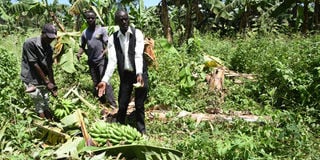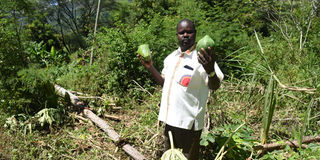Why Kerio Valley residents want 600 elephants moved from reserve

Farmers show banana crops destroyed by marauding elephants from Rimoi National Reserve at a farm in Tinyar village, Marakwet of Elgeyo Marakwet County on October 31, 2020.
What you need to know:
- Locals lament that farms are invaded by the jumbos yearly, causing them huge losses
- They claim they collectively lost crop worth Sh51 million destroyed by the jumbos in 2020
- Rimoi Game Reserve is home to more than 600 elephants
- Each year between June and September, they migrate from Nasalot Game Reserve in Turkana to Rimoi Game Reserve in Elgeyo Marakwet for the breeding season
- However, locals have encroached on their migratory corridor and established farmlands, where the animals destroy crops
Residents of Elgeyo Marakwet now want elephants at the Rimoi Game Reserve moved to safeguard their livelihoods after the tuskers’ incessant invasions onto farms.
The locals are particularly irked by the lack of compensation for loss of life and property, with claims to the Kenya Wildlife Service (KFS) remaining unpaid for more than a decade.
To the residents, the elephants are more of a curse than a blessing and the time is ripe for them to be moved elsewhere.
Mr Michael Tuitoek, one of the locals, laments that farms are invaded by the jumbos yearly, causing them huge losses.
“Last year my crops worth over Sh500,000 were destroyed by the elephants. The same has happened in previous years and since we do not want to kill the jumbos like the lions that were killed in Kajiado for preying on locals’ livestock, we want them to be translocated to end our perennial misery,” he said.
Locals in his Chebinyiny location are seeking more than Sh20 million in compensation for crops damaged in the past four years.
“We have not witnessed any form of social investment from KWS, apart from a dormitory built at a local secondary a decade ago. They would have even initiated bursary schemes for families whose crops were destroyed or even compensated us on a timely basis,” he protested.
Waiting for compensation
Another victim Mr Korir Chemnjor has been waiting to be compensated since 2010 after marauding jumbos invaded his farm, destroying crops worth more than Sh1 million.
“My life has never been the same because of the invasion and we have been riding on reverse. There is no point of us harbouring elephants whose presence is more of a curse to us and that is why they should be moved,” he said.
He accused KWS of acting acting irresponsibly by failing to pay victims on time for the damages, yet the elephants continue to destroy their farms.
“What is interesting is the fact that we all have duly filled claim forms that are now gathering dust in KWS offices. As time goes by, we may lose the compensation claims,” he said.

The main entrance to Rimoi National Game Reserve in Elgeyo Marakwet County.
Rimoi Game Reserve is home to more than 600 elephants.
Each year between June and September, they migrate from Nasalot Game Reserve in Turkana to Rimoi Game Reserve in Elgeyo Marakwet for the breeding season.
Migratory corridor
However, locals have encroached on their migratory corridor and established farmlands, where the animals destroy crops.
Hundreds of acres of acres of watermelon, bananas, mangoes, paw paws, maize, beans, groundnuts, green grams, sorghum, and millet are now in a ruins.
The most affected areas are Kamogich, Rimoi, Chebinyiny, Chepsigot, Kaben, Endo, Talai, Koibirir, Mokoro, Murkutwo, Mon, and Arror, where the elephants have left a trail of destruction on farms.
There is an electric fence erected around the park, but lack of maintenance has seen it break down, making the jumbos easily stray out of the reserve into farms.
Mr Nixon Changwony, said his and other farmers’ livelihoods are in ruins because of the elephants.
“I had over 400 tissue culture bananas and 280 trees of paw paws which were ready for market, but are now in ruins courtesy of the elephants. KWS should move with speed and arrest the situation because the crops were my livelihood,” lamented Mr Changwony.
He said a lasting solution was urgently needed, and it is upon the agency to ensure the jumbos do not wander into farms.

William Komen, Principal of St Mary’s Mon Boys High School in Marakwet East, Elgeyo Marakwet County showing unripe pawpaw fruits at the school farm on October 31, 2020, after crops were destroyed by marauding elephants from Rimoi National Game Reserve.
Sh51million loss in a year
Locals claim in 2020, they collectively lost crop worth Sh51 million.
“Last year we also suffered the same loss. Elephant invasion has now become a perennial issue and we need compensation for all the damage to enable us to carry on with our lives. We are grappling with bandits on one hand and now the issue of elephants is another menace,” he said.
Compensation Act
The Wildlife Conservation and Management Act, 2013 established a Wildlife Compensation Scheme to be used for financing compensation claims for human death, injury or crop and property damage caused by wildlife.
In case of death, Sh5 million is paid to the victim family, Sh 3million for a permanent disability, while for any other injury, a maximum of Sh2 million, depending on the extent of injury is awarded.
Any person who suffers loss or damage to crops, livestock or other property from wildlife specified may submit a claim to the County Wildlife Conservation and Compensation Committee, for verification and recommendation to the Service for due consideration.
Compensation rates are valued at ruling market rates, once it is established that victims took reasonable measures, to protect such crops, livestock or property from damage by wildlife, while land use practices should be compatible with the ecosystem-based management plan for the area.





